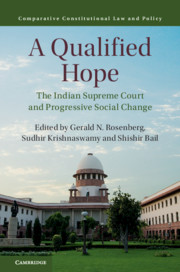Book contents
- A Qualified Hope
- Comparative Constitutional Law and Policy
- A Qualified Hope
- Copyright page
- Contents
- Notes on Contributors
- Foreword
- Acknowledgments
- Introduction
- Part I The Supreme Court of India – An Institutional Overview
- Part II The Supreme Court of India, Social and Political Mobilization
- Part III Welfare Rights and the Environment
- Part IV Discrimination
- 11 The Polarizing Face of Law
- 12 Evaluating the Impact of the Indian Supreme Court Judgment on Sex-Selective Abortion
- Conclusion
- References
11 - The Polarizing Face of Law
Religious Conversion Judgments and Political Discourse in India
from Part IV - Discrimination
Published online by Cambridge University Press: 19 August 2019
- A Qualified Hope
- Comparative Constitutional Law and Policy
- A Qualified Hope
- Copyright page
- Contents
- Notes on Contributors
- Foreword
- Acknowledgments
- Introduction
- Part I The Supreme Court of India – An Institutional Overview
- Part II The Supreme Court of India, Social and Political Mobilization
- Part III Welfare Rights and the Environment
- Part IV Discrimination
- 11 The Polarizing Face of Law
- 12 Evaluating the Impact of the Indian Supreme Court Judgment on Sex-Selective Abortion
- Conclusion
- References
Summary
The chapter examines the relationship between India’s higher judiciary judgments on affirmative action benefits and the response of the Hindu Right to religious conversion. It makes three arguments: First, progressive court interventions can be impeded by restrictive constitutional provisions. India’s judges are hamstrung by the embedded contradiction in the law, which, in its pursuit of one constitutional goal (social justice) has undermined another (religious freedom). Second, even if judges aspire to implement the spirit of the law, and try to provide an equitable result to these groups, their efforts need not produce positive social change. Third, contrary to the view that apex courts produce moderating effects in the arena of religious freedom, judgments have unintended and deleterious impact on religious toleration and may deepen polarization. The empirical analysis highlights this argument by examining the impact on the access of religious converts from Scheduled Caste and Scheduled Tribe groups to affirmative action benefits in 80 religious conversion cases from 1950-2006 in India's higher judiciary. It scrutinizes the Hindu Right's historical and contemporary responses (in parliamentary debates, newschapter reports, and interviews), to these judgments and highlights the unintended consequences of the courts' decisions, namely religious polarization.
Keywords
Information
- Type
- Chapter
- Information
- A Qualified HopeThe Indian Supreme Court and Progressive Social Change, pp. 295 - 318Publisher: Cambridge University PressPrint publication year: 2019
